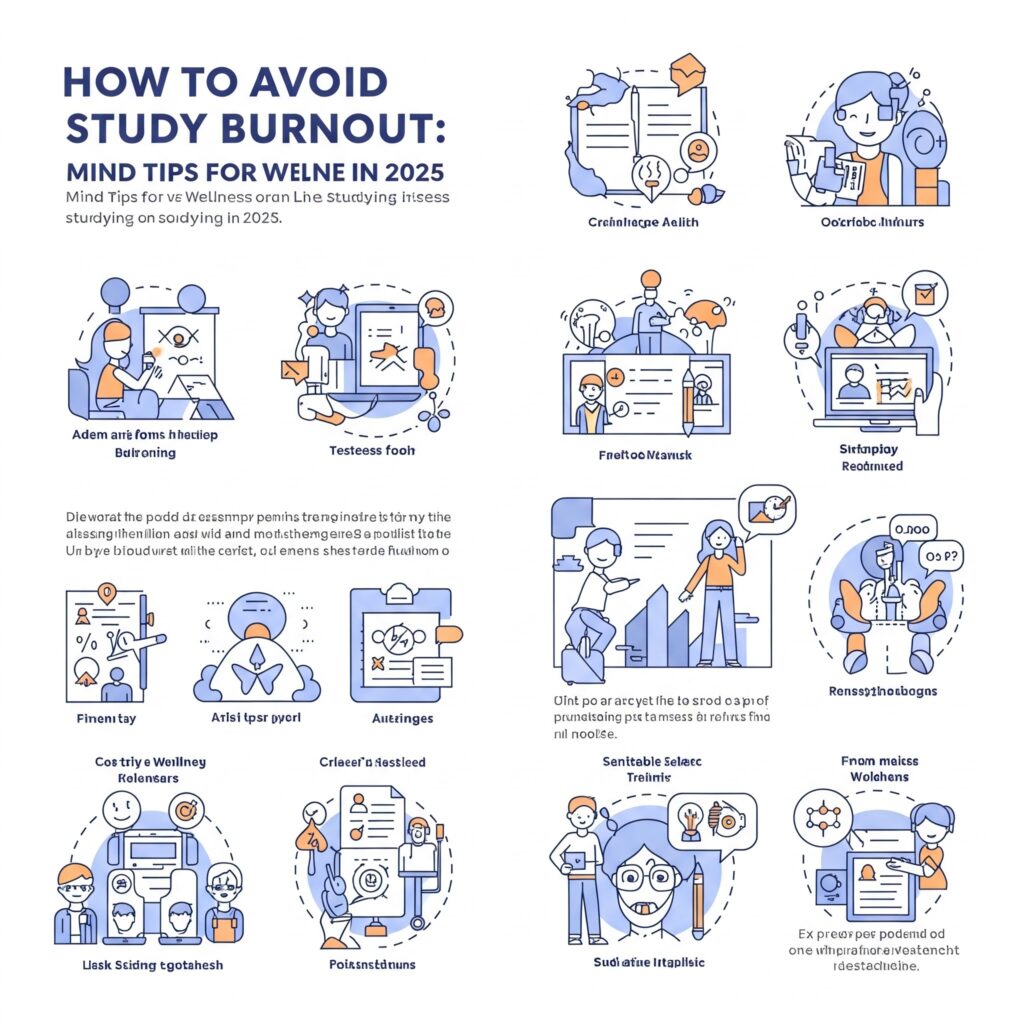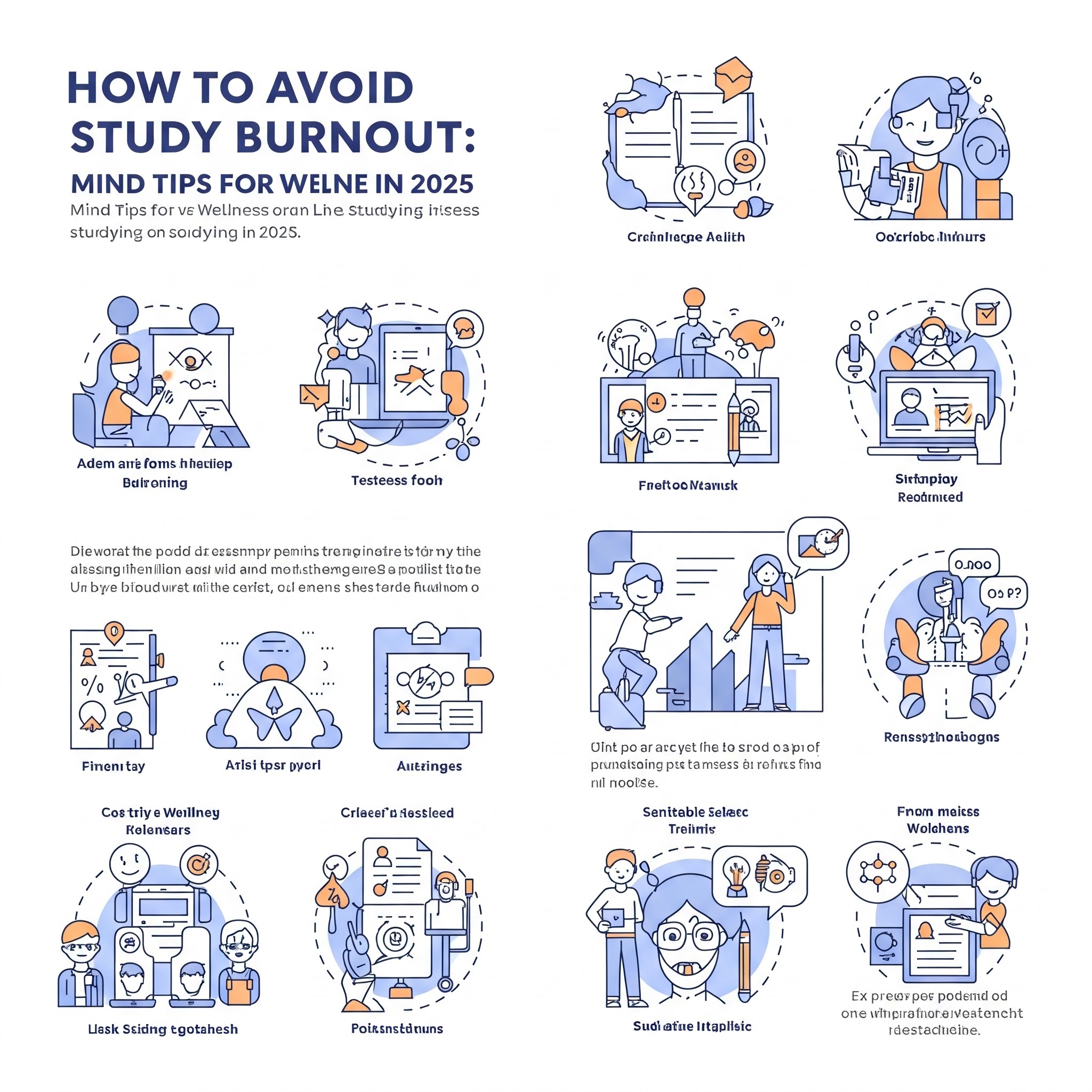HOW TO AVOID STUDY BURNOUT: MIND TIPS FOR WELLNESS STUDING 2025
With due dates looming and stakes being most elevated in current high-stakes learning culture, increasingly more students are perched on the edge of burnout. Burnout is not weariness—it is an emotional, physical, and mental depletion created by prolonged tension. To be burnt out, learning is work rather than a pursuit of understanding, motivation is threatened, and general performance diminishes.

The good news? Burnout is preventable and treatable. With the right strategies, students can maintain a healthy mind during study, and even bounce back from losing interest in learning. Here are practical, evidence-based tips on how to remain energized, motivated, and mentally healthy.
1. KNOW THE SIGNS OF STUDY BURNOUT
Unless you know the signs of burnout, you cannot steer clear of it or fix it. Typical symptoms are:
Persistent fatigue or exhaustion despite sleeping
Lack of interest or drive to learn
More irritability or frustration
Trouble with concentration or remembering things
Physical symptoms such as headaches or sleeplessness
Feelings of despair or being overwhelmed
Identifying these are not flaws but messages from your body and mind is the start of healing and prevention.
2. SET REALISTIC GOALS AND BREAK TASKS INTO CHUNKS
One of the biggest reasons for burnout is attempting to do too much simultaneously. When taking a test or doing a massive project, overwhelming your brain is not going to complete the task.
Set SMART goals: Specific, Measurable, Achievable, Relevant, and Time-bound goals keep you level-headed and centered.
Divide your work into bites: Divide gargantuan goals into tiny bites. Instead of “I will study biology today,” say “I will study cell structure for 30 minutes.”
Small wins create momentum and eliminate overwhelm.
3. ESTABLISH A STUDY RHYTHM
Structure provides direction to life and removes mental tiredness. If your mind is on autopilot regarding what happens and when, it saves energy and focuses intensely.
Study the same time every day.
Set up a designated study area—a distraction-free area and a clutter-free room.
Use techniques like the Pomodoro Technique: work for 25 minutes and rest for 5 minutes. Have a longer break of 15–30 minutes after four cycles.
Routine does not have to be strict; it’s more a case of creating habits that fit in with the natural rhythm of your brain.
4. PRIORITY SLEEP
Sleep isn’t a privilege—it’s a necessity. Research shows that memory consolidation, control of emotions, and mental operation all take place during sleep. All-nighters might feel like they’re getting things done, but they end up causing more harm than benefit.
Strive for 7–9 hours of sleep each night.
Keep your sleep schedule consistent, even on the weekends.
Get off devices and caffeine at least an hour or so before bedtime.
A rested mind is faster, more observant, and much stronger.
5. FEED YOUR BODY GOOD NUTRITION AND WATER
Your brain needs to be fed in order to work best. Malnourishment is one of the causes of slow thinking, slowness, and crankiness—all symptoms of burnout.
Feed your body good food and water in the form of good whole grains, lean protein, fruits, vegetables, and good fats.
Give brain foods in the form of walnuts, eggs, blueberries, and fish.
Hydrate yourself—make sure to consume no less than 6–8 glasses daily.
Avoid excessive caffeine and sweets. They provide instant energy but put undue burden on your system later.
6. EXERCISE REGULARLY TO IMPROVE YOUR MENTAL WELL-BEING
Exercise induces the release of endorphins and dopamine, mood-enhancing and concentration-improving chemicals. Exercise decreases tension, enhances your sleep, and improves brain function.
No gym membership necessary:
Take a 20-minute walk every day.
Stretch, practice yoga, or exercise in the comfort of your home.
Make short exercise breaks to refresh yourself after long study periods.
Even small amounts of exercise can make gigantic differences in your energy and sharpness.
7. TAKE TIME FOR PLAY AND LEISURE
Burnout most often occurs because there is no balance. Too much studying and not enough relaxation drains your emotional capital. Take time off just like you take time to study.
Watch a film, read a non-academic book, or listen to music.
Spend time with friends or family.
Discover activities that recharge and make you feel alive and creative.
Relaxation is not laziness—it’s essential recovery time for your brain.
8. PRACTICE MINDFULNESS AND STRESS MANAGEMENT TECHNIQUES
The more stressed you are, the more prone to burnout. Stress can be minimized by mindfulness and meditation, which also improve focus and keep you grounded even under pressure.
Practice deep breathing exercises or apps such as Headspace or Calm.
Journal three things you’re grateful for in a daily gratitude journal.
Swap negative self-talk for positive affirmations.
Mindfulness for even 10 minutes per day can train your brain in concentration and toughness.
9. AVOID COMPARISONS AND PERFECTIONISM
Too many students are burned out because they’re always comparing themselves to someone else or striving to be perfect. Social media overwhelms them more, as they feel everyone else is doing it better.
Remember: Progress is personal. Mind your own path.
Accept that mistakes are part of the process.
Trade perfectionism for self-compassion. Be kind to yourself the same way you would be to a struggling friend.
Let go of having to be perfect. The strength of diligence over perpetual perfection is a much stronger asset.
10. SEEK HELP WHEN YOU NEED IT
It is okay to ask for help. If you are struggling with school or your feelings, asking for help counts.
Talk to teachers, mentors, or guidance counselors if you are behind.
Talk to supportive family members or friends about your feelings.
Don’t wait to get mental health advice from a counselor or psychologist.
It is not weakness, but strength, to ask for help. You don’t have to do everything by yourself.
11. CELEBRATE YOUR ACHIEVEMENTS, BIG OR SMALL
Celebrate your effort and achievement to maximize motivation and minimize burnout.
Keep a progress log to track how far you’ve come.
Reward yourself when you achieve study milestones—treat, break, or delight.
Take a look at what you’re proud of each week.
Focus on achievements establishes a positive feedback cycle that encourages learning and lessens stress.
CONCLUSION: BALANCE IS THE SECRET TO SUSTAINABLE LEARNING
Burnout is not something to be proud of; it’s an indicator that you need to do something else. Taking care of your mind, body, and spirit puts an end to burnout, as well as learning happier and better.
Learning is a marathon, not a sprint. Getting paced, taking care of your head and body, and learning to enjoy learning will sustain you and keep you mentally resilient.
Remember, the aim isn’t so much to work hard—but to work smart, remain healthy, and flourish in the process.

